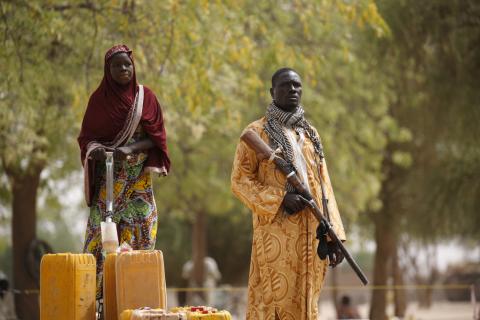Advertisement
Climate change pushes farmers to 'tipping point' in Lake Chad crisis
DAKAR (Thomson Reuters Foundation) - Climate change must be addressed to tackle conflict around Lake Chad, researchers said on Wednesday, as increasingly extreme weather has pushed poor farmers and fishermen to take up arms.
The region bordering Nigeria, Niger, Chad and Cameroon has been hit by a decade-long Islamist insurgency, uprooting 2.5 million people in one of the world's most neglected crises.
Irregular rains and rising temperatures have spurred on the conflict by causing food shortages and frustration, while fighting has made it harder for people to cope with these natural changes, said a report by German think-tank adelphi.
"People tend to think that you deal with the immediate humanitarian issues, then think about climate after," lead author Janani Vivekananda told the Thomson Reuters Foundation.
"It doesn't come later, it comes now," she said, urging governments and aid agencies to help people deal with the changing weather by giving them better data about rainfall and support to change their livelihoods.
Some 40 million people living in the Lake Chad basin - one of Africa's largest freshwater bodies surrounded by semi-desert - rely on it for crop and livestock farming, fishing and trade, according to the United Nations Development Programme.
The area is a stronghold for Islamic State in West Africa (ISWA) and Boko Haram, which began an insurgency in Nigeria in 2009 that has spread across its borders.
ISWA - which split from Boko Haram in 2016 - has tried to win over local people by digging wells, giving out seeds and providing safe pasture for herders in a bid to form an administration around the shores and islands.
Lake Chad fluctuates regularly with the rains, leaving fertile land for farming on its shores, said Vivekananda, but the amount and timing of rainfall has become unpredictable, so people no longer know what to plant and when.
"It is reaching a tipping point where their livelihoods are no longer viable," she said.
The lake shrunk by about 90 percent due to severe droughts from the 1960s to the 1980s, causing competition over resources that is another factor in the conflict today, she said.
But others warned against emphasising climate change over politics.
"Focusing on natural factors is very convenient," said Vincent Foucher, an expert on Boko Haram at the French National Centre for Scientific Research.
"I'm a bit worried that it takes people's eyes away from the responsibility of the army and the state," he said.
(Reporting by Nellie Peyton; Editing by Katy Migiro)



















Add new comment